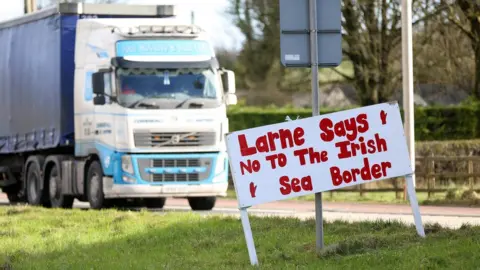Arlene Foster: Why did the DUP move against its leader?
 PA Media
PA MediaRumours about bids to remove Arlene Foster from the helm of the Democratic Unionist Party (DUP) had been swirling for months.
On many occasions they'd been easily shrugged off by the first minister.
But she could shrug no longer, given many of those previously loyal to her abandoned the Foster ship.
However questions remain about the move's timing and what has caused it.
Firstly, pressure to remove her has come from the outworkings of Brexit and the Irish Sea border.
 Pacemaker
PacemakerArlene Foster led the party's campaign in favour of Brexit, but struggled once its ramifications for the union came into view.
Feeling betrayed by Boris Johnson when he signed up to the Brexit deal that would mean different trading arrangements for Northern Ireland from the rest of the UK, Mrs Foster faced accusations of poor judgement for trusting the prime minister.
She hardened her stance earlier this year after concerns about the protocol's effects on GB-NI trade became clear, and demanded it be scrapped.
The party even published a five-point plan it aimed to use in a bid to replace the protocol and said it would no longer engage with north-south bodies on Brexit.
But that was not enough to quash internal unhappiness at how the issue was being managed, with some elected representatives concerned it would affect the party's chances in the next assembly election in May 2022.
It may also be that some assembly members who were worried about the prospect of retaining their seats have drawn the conclusion that their own political positions trump loyalty to the leadership at this crucial time, just as election strategies are being devised.
 Pacemaker
PacemakerRecent scenes of rioting and violence in loyalist communities against the protocol and criticism of unionist politicians have added to the narrative that the current DUP leadership is not reflecting or understanding the views of those it is supposed to represent.
It may be a key issue in all of this, but it's not the only factor.
Party sources have given strong hints about growing concern that Mrs Foster held a softer stance on some social issues than her predecessors and was willing to move the party in that direction.
The DUP's roots are deeply conservative, staunchly opposing abortion and same-sex marriage.
Gay conversion therapy
Westminster legislated to change NI's laws on those issues in 2019 when devolution was suspended - the DUP opposed it at the time, but it did not go down well with many grassroots party members.
Then last week, a debate on a motion in the Stormont assembly calling for a ban on gay conversion therapy further raised eyebrows when Mrs Foster was one of five DUP assembly members who abstained on it.
The majority of the party had voted against the motion, arguing that any legislation to outlaw the practice needed to ensure safeguards for churches.
Although it was a free vote, it openly exposed the gulf between Mrs Foster and most of her assembly team at a time when she was already under pressure. For some party members, it was the final straw.
There are also those within the DUP who point to Mrs Foster's difficulties in retaining authority, claiming that she was too weak to discipline some of her MPs and assembly members for breaching Covid-19 guidelines or making comments at odds with party policy.
To further understand the timing of the leadership challenge, it's important to know how DUP internal rules work.
Rule 12 states that a leadership election should take place before 30 April every year - normally it is an informal procedure to simply reappoint the office holder as opposed to an actual contest.
However it's understood that this has not happened yet this year, and it's believed those behind the motion challenging Mrs Foster had called on the DUP chairman to invoke the rule and call an election for leader within seven days.
A fight for the heart and soul of the DUP is on which may chart the party's course for some time to come.
